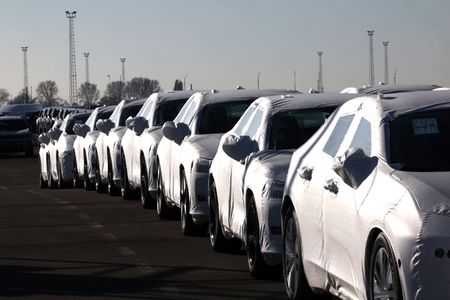By Alessandro Parodi
(Reuters) – Sales of fully electric car sales In Europe were up 37.3% in January, industry data showed on Tuesday, although the sharp rise was not enough to compensate for a drop in petrol and diesel vehicles, leaving overall sales down by 2.1%.
Figures from the European Automobile Manufacturers Association (ACEA) showed that all-electric brand Tesla saw a 45.2% drop in the European Union, Britain and the European Free Trade Area, while sales at its Chinese competitor SAIC Motor , which owns the MG brand, were up 36.8%.
WHY IT’S IMPORTANT
The EU executive will present auto sector plans on March 5, following talks with automakers, unions and interest groups.
EU carmakers, which are struggling to compete with Chinese rivals and bracing for U.S. tariffs, are urging the Commission to grant relief from potential fines resulting from CO2 car emission targets that came into effect in January.
Some automakers have increased the prices of petrol engine models to encourage EV adoption, but the industry fears that customers will simply buy fewer cars.
Electric transport groups, instead, claim that any push to weaken the targets will disrupt investments in EV infrastructure and hamper the bloc’s competitiveness.
BY THE NUMBERS
January sales in the EU, Britain and EFTA fell slightly below 1 million cars sold, the lowest volume since August.
Registrations at Volkswagen and Renault grew by 5.3% and 5.4% respectively, while they fell by 16% at Stellantis.
In the EU, January sales fell by 2.6%, even as the registrations of battery electric (BEV) and hybrid electric (HEV) cars grew by 34% and 18.4% respectively. Plug-in hybrids (PHEVs) sales were instead down by 8.5%.
Electrified vehicles – either BEV, HEV or PHEV – sold in the bloc accounted for 57.2% of passenger car registrations in January, up from 47.4% in the previous year.
Among the largest EU markets, Spain sales increased by 5.3%, while in France, Italy and Germany they dropped by 6.2%, 5.8% and 2.8%. In Britain they were down 2.5%.
CONTEXT
While battling to bring down high costs in home markets and fighting competition from China, European carmakers are also preparing to face potential import tariffs imposed by U.S. President Donald Trump.
Trump has raised tariffs on aluminium and steel and threatened a 25% tariff on imports from Mexico and Canada, as well as on all autos and semiconductors.
(Reporting by Alessandro Parodi in Gdansk; Editing by Sandra Maler and Louise Heavens)










